Parental Psychopathology's Impact on Child Psychological Development
VerifiedAdded on 2022/08/16
|12
|3112
|17
Essay
AI Summary
This essay explores the significant impact of parental psychopathology on child psychological adjustment, referencing key theories from developmental psychology and relevant research findings. It delves into the influence of parental mental health issues, such as anxiety, depression, and substance abuse, on children's behavioral and emotional development. The essay examines how parent-child relationships, including parenting styles (authoritative, permissive, authoritarian, and uninvolved), mediate these effects. Drawing on two journal articles and related presentations, the essay discusses the role of genetics, environmental factors, and disruptions in parenting processes in shaping child outcomes. It highlights the importance of considering both maternal and paternal influences and offers implications for future research, emphasizing the need for a comprehensive understanding of parental psychopathology's impact on children's mental health and well-being.
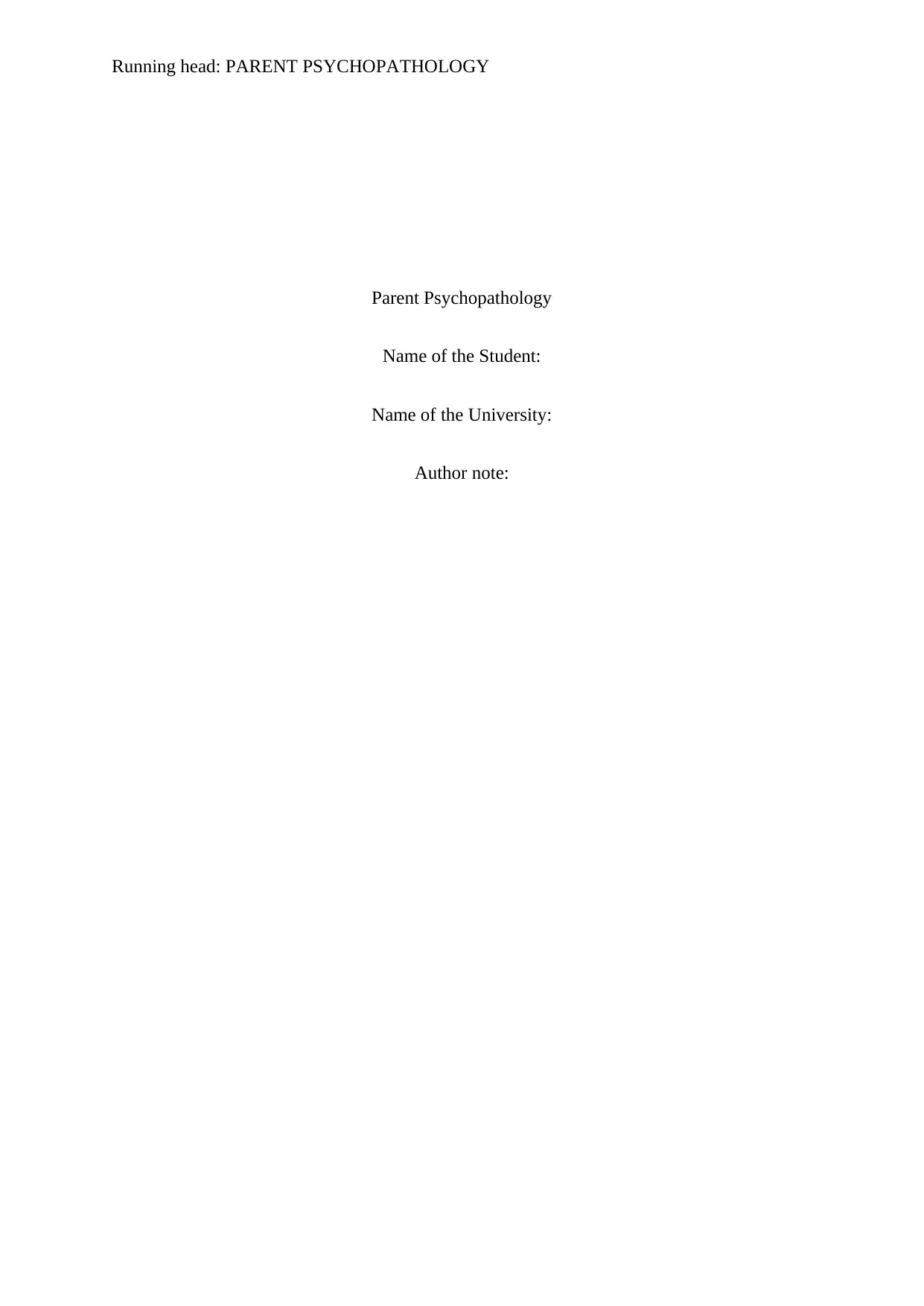
Running head: PARENT PSYCHOPATHOLOGY
Parent Psychopathology
Name of the Student:
Name of the University:
Author note:
Parent Psychopathology
Name of the Student:
Name of the University:
Author note:
Paraphrase This Document
Need a fresh take? Get an instant paraphrase of this document with our AI Paraphraser
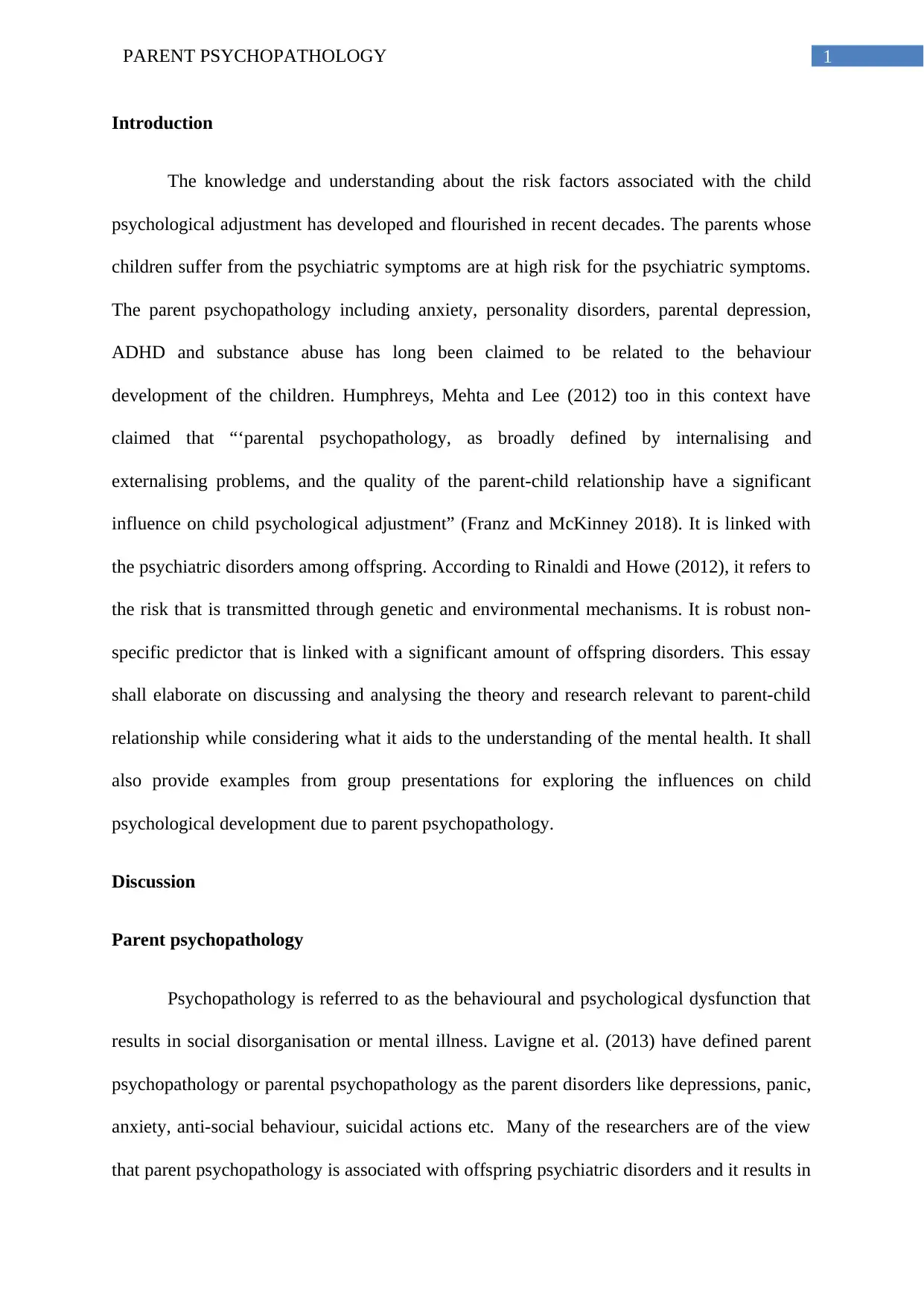
1PARENT PSYCHOPATHOLOGY
Introduction
The knowledge and understanding about the risk factors associated with the child
psychological adjustment has developed and flourished in recent decades. The parents whose
children suffer from the psychiatric symptoms are at high risk for the psychiatric symptoms.
The parent psychopathology including anxiety, personality disorders, parental depression,
ADHD and substance abuse has long been claimed to be related to the behaviour
development of the children. Humphreys, Mehta and Lee (2012) too in this context have
claimed that “‘parental psychopathology, as broadly defined by internalising and
externalising problems, and the quality of the parent-child relationship have a significant
influence on child psychological adjustment” (Franz and McKinney 2018). It is linked with
the psychiatric disorders among offspring. According to Rinaldi and Howe (2012), it refers to
the risk that is transmitted through genetic and environmental mechanisms. It is robust non-
specific predictor that is linked with a significant amount of offspring disorders. This essay
shall elaborate on discussing and analysing the theory and research relevant to parent-child
relationship while considering what it aids to the understanding of the mental health. It shall
also provide examples from group presentations for exploring the influences on child
psychological development due to parent psychopathology.
Discussion
Parent psychopathology
Psychopathology is referred to as the behavioural and psychological dysfunction that
results in social disorganisation or mental illness. Lavigne et al. (2013) have defined parent
psychopathology or parental psychopathology as the parent disorders like depressions, panic,
anxiety, anti-social behaviour, suicidal actions etc. Many of the researchers are of the view
that parent psychopathology is associated with offspring psychiatric disorders and it results in
Introduction
The knowledge and understanding about the risk factors associated with the child
psychological adjustment has developed and flourished in recent decades. The parents whose
children suffer from the psychiatric symptoms are at high risk for the psychiatric symptoms.
The parent psychopathology including anxiety, personality disorders, parental depression,
ADHD and substance abuse has long been claimed to be related to the behaviour
development of the children. Humphreys, Mehta and Lee (2012) too in this context have
claimed that “‘parental psychopathology, as broadly defined by internalising and
externalising problems, and the quality of the parent-child relationship have a significant
influence on child psychological adjustment” (Franz and McKinney 2018). It is linked with
the psychiatric disorders among offspring. According to Rinaldi and Howe (2012), it refers to
the risk that is transmitted through genetic and environmental mechanisms. It is robust non-
specific predictor that is linked with a significant amount of offspring disorders. This essay
shall elaborate on discussing and analysing the theory and research relevant to parent-child
relationship while considering what it aids to the understanding of the mental health. It shall
also provide examples from group presentations for exploring the influences on child
psychological development due to parent psychopathology.
Discussion
Parent psychopathology
Psychopathology is referred to as the behavioural and psychological dysfunction that
results in social disorganisation or mental illness. Lavigne et al. (2013) have defined parent
psychopathology or parental psychopathology as the parent disorders like depressions, panic,
anxiety, anti-social behaviour, suicidal actions etc. Many of the researchers are of the view
that parent psychopathology is associated with offspring psychiatric disorders and it results in
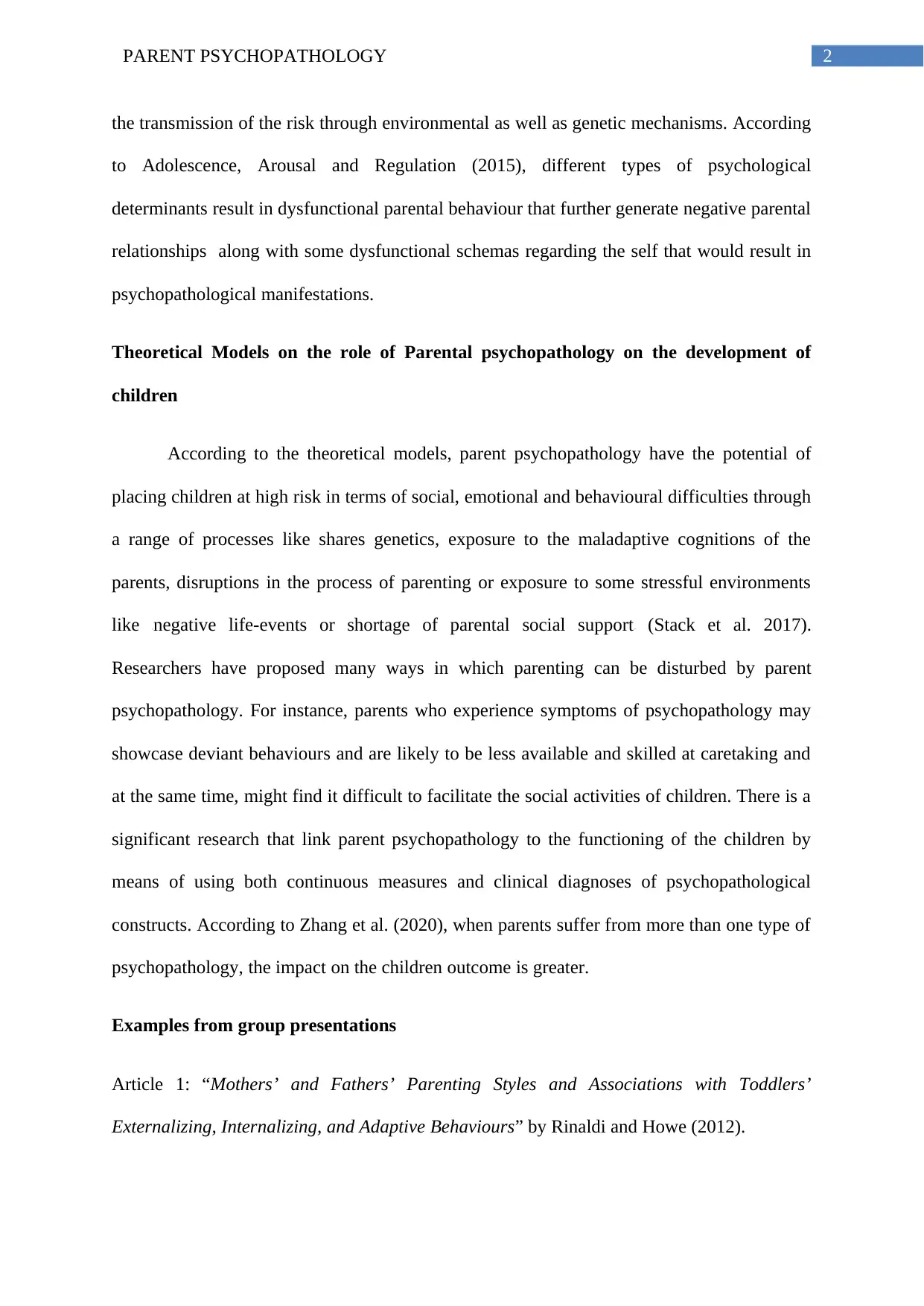
2PARENT PSYCHOPATHOLOGY
the transmission of the risk through environmental as well as genetic mechanisms. According
to Adolescence, Arousal and Regulation (2015), different types of psychological
determinants result in dysfunctional parental behaviour that further generate negative parental
relationships along with some dysfunctional schemas regarding the self that would result in
psychopathological manifestations.
Theoretical Models on the role of Parental psychopathology on the development of
children
According to the theoretical models, parent psychopathology have the potential of
placing children at high risk in terms of social, emotional and behavioural difficulties through
a range of processes like shares genetics, exposure to the maladaptive cognitions of the
parents, disruptions in the process of parenting or exposure to some stressful environments
like “negative life-events or shortage of parental social support” (Stack et al. 2017).
Researchers have proposed many ways in which parenting can be disturbed by parent
psychopathology. For instance, parents who experience symptoms of psychopathology may
showcase deviant behaviours and are likely to be less available and skilled at caretaking and
at the same time, might find it difficult to facilitate the social activities of children. There is a
significant research that link parent psychopathology to the functioning of the children by
means of using both continuous measures and clinical diagnoses of psychopathological
constructs. According to Zhang et al. (2020), when parents suffer from more than one type of
psychopathology, the impact on the children outcome is greater.
Examples from group presentations
Article 1: “Mothers’ and Fathers’ Parenting Styles and Associations with Toddlers’
Externalizing, Internalizing, and Adaptive Behaviours” by Rinaldi and Howe (2012).
the transmission of the risk through environmental as well as genetic mechanisms. According
to Adolescence, Arousal and Regulation (2015), different types of psychological
determinants result in dysfunctional parental behaviour that further generate negative parental
relationships along with some dysfunctional schemas regarding the self that would result in
psychopathological manifestations.
Theoretical Models on the role of Parental psychopathology on the development of
children
According to the theoretical models, parent psychopathology have the potential of
placing children at high risk in terms of social, emotional and behavioural difficulties through
a range of processes like shares genetics, exposure to the maladaptive cognitions of the
parents, disruptions in the process of parenting or exposure to some stressful environments
like “negative life-events or shortage of parental social support” (Stack et al. 2017).
Researchers have proposed many ways in which parenting can be disturbed by parent
psychopathology. For instance, parents who experience symptoms of psychopathology may
showcase deviant behaviours and are likely to be less available and skilled at caretaking and
at the same time, might find it difficult to facilitate the social activities of children. There is a
significant research that link parent psychopathology to the functioning of the children by
means of using both continuous measures and clinical diagnoses of psychopathological
constructs. According to Zhang et al. (2020), when parents suffer from more than one type of
psychopathology, the impact on the children outcome is greater.
Examples from group presentations
Article 1: “Mothers’ and Fathers’ Parenting Styles and Associations with Toddlers’
Externalizing, Internalizing, and Adaptive Behaviours” by Rinaldi and Howe (2012).
⊘ This is a preview!⊘
Do you want full access?
Subscribe today to unlock all pages.

Trusted by 1+ million students worldwide
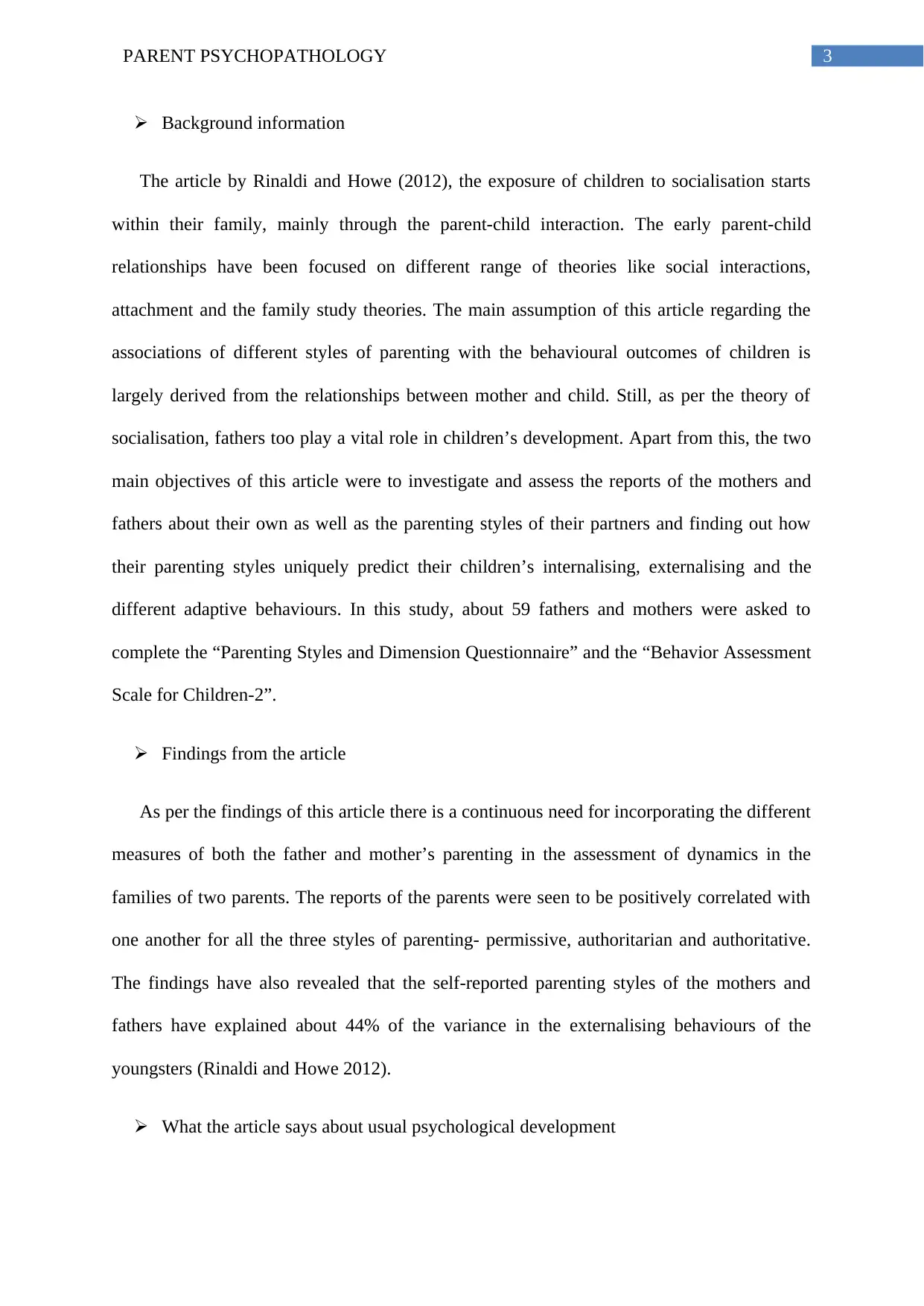
3PARENT PSYCHOPATHOLOGY
Background information
The article by Rinaldi and Howe (2012), the exposure of children to socialisation starts
within their family, mainly through the parent-child interaction. The early parent-child
relationships have been focused on different range of theories like social interactions,
attachment and the family study theories. The main assumption of this article regarding the
associations of different styles of parenting with the behavioural outcomes of children is
largely derived from the relationships between mother and child. Still, as per the theory of
socialisation, fathers too play a vital role in children’s development. Apart from this, the two
main objectives of this article were to investigate and assess the reports of the mothers and
fathers about their own as well as the parenting styles of their partners and finding out how
their parenting styles uniquely predict their children’s internalising, externalising and the
different adaptive behaviours. In this study, about 59 fathers and mothers were asked to
complete the “Parenting Styles and Dimension Questionnaire” and the “Behavior Assessment
Scale for Children-2”.
Findings from the article
As per the findings of this article there is a continuous need for incorporating the different
measures of both the father and mother’s parenting in the assessment of dynamics in the
families of two parents. The reports of the parents were seen to be positively correlated with
one another for all the three styles of parenting- permissive, authoritarian and authoritative.
The findings have also revealed that the self-reported parenting styles of the mothers and
fathers have explained about 44% of the variance in the externalising behaviours of the
youngsters (Rinaldi and Howe 2012).
What the article says about usual psychological development
Background information
The article by Rinaldi and Howe (2012), the exposure of children to socialisation starts
within their family, mainly through the parent-child interaction. The early parent-child
relationships have been focused on different range of theories like social interactions,
attachment and the family study theories. The main assumption of this article regarding the
associations of different styles of parenting with the behavioural outcomes of children is
largely derived from the relationships between mother and child. Still, as per the theory of
socialisation, fathers too play a vital role in children’s development. Apart from this, the two
main objectives of this article were to investigate and assess the reports of the mothers and
fathers about their own as well as the parenting styles of their partners and finding out how
their parenting styles uniquely predict their children’s internalising, externalising and the
different adaptive behaviours. In this study, about 59 fathers and mothers were asked to
complete the “Parenting Styles and Dimension Questionnaire” and the “Behavior Assessment
Scale for Children-2”.
Findings from the article
As per the findings of this article there is a continuous need for incorporating the different
measures of both the father and mother’s parenting in the assessment of dynamics in the
families of two parents. The reports of the parents were seen to be positively correlated with
one another for all the three styles of parenting- permissive, authoritarian and authoritative.
The findings have also revealed that the self-reported parenting styles of the mothers and
fathers have explained about 44% of the variance in the externalising behaviours of the
youngsters (Rinaldi and Howe 2012).
What the article says about usual psychological development
Paraphrase This Document
Need a fresh take? Get an instant paraphrase of this document with our AI Paraphraser
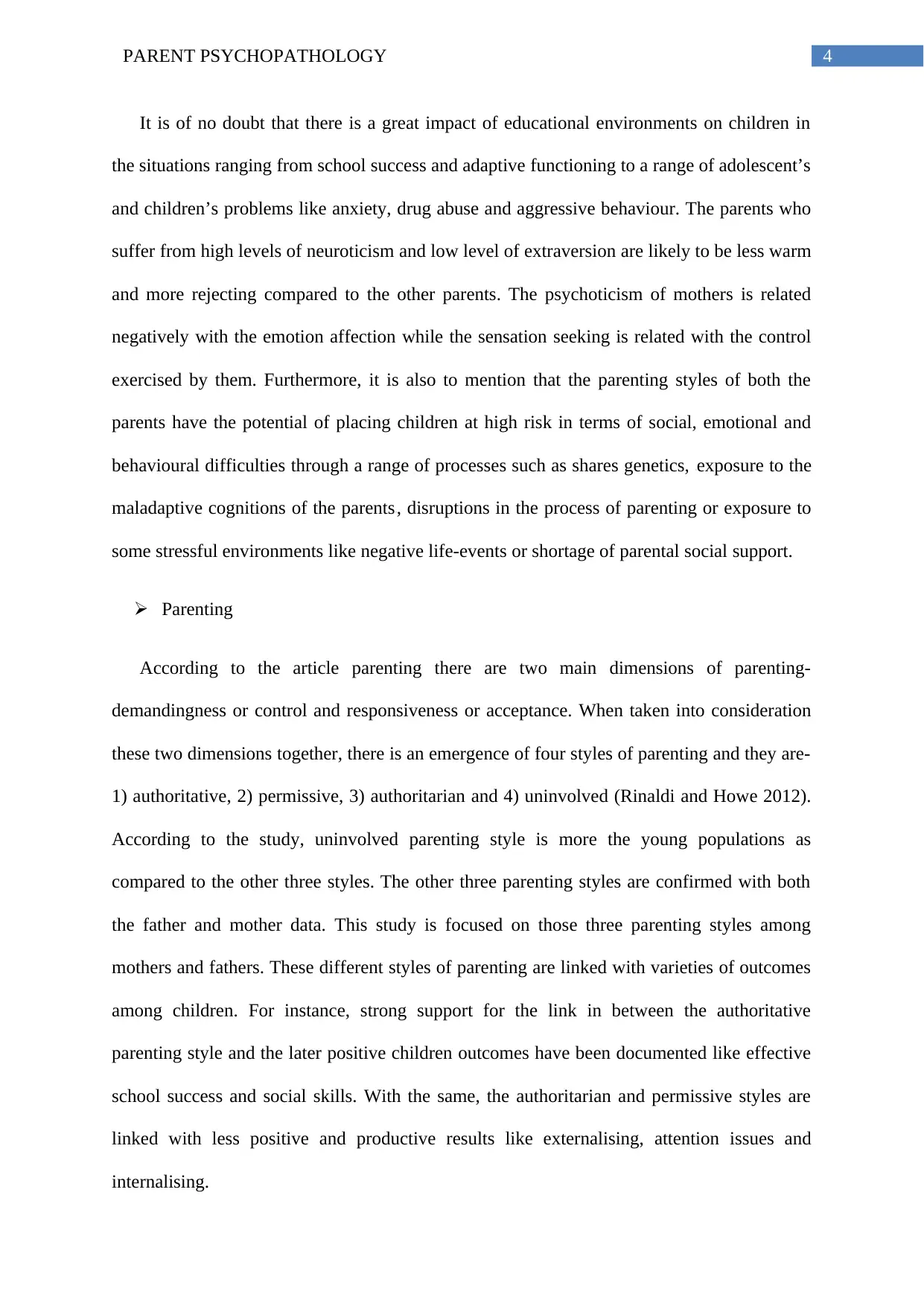
4PARENT PSYCHOPATHOLOGY
It is of no doubt that there is a great impact of educational environments on children in
the situations ranging from school success and adaptive functioning to a range of adolescent’s
and children’s problems like anxiety, drug abuse and aggressive behaviour. The parents who
suffer from high levels of neuroticism and low level of extraversion are likely to be less warm
and more rejecting compared to the other parents. The psychoticism of mothers is related
negatively with the emotion affection while the sensation seeking is related with the control
exercised by them. Furthermore, it is also to mention that the parenting styles of both the
parents have the potential of placing children at high risk in terms of social, emotional and
behavioural difficulties through a range of processes such as shares genetics, “exposure to the
maladaptive cognitions of the parents”, disruptions in the process of parenting or exposure to
some stressful environments like negative life-events or shortage of parental social support.
Parenting
According to the article parenting there are two main dimensions of parenting-
demandingness or control and responsiveness or acceptance. When taken into consideration
these two dimensions together, there is an emergence of four styles of parenting and they are-
1) authoritative, 2) permissive, 3) authoritarian and 4) uninvolved (Rinaldi and Howe 2012).
According to the study, uninvolved parenting style is more the young populations as
compared to the other three styles. The other three parenting styles are confirmed with both
the father and mother data. This study is focused on those three parenting styles among
mothers and fathers. These different styles of parenting are linked with varieties of outcomes
among children. For instance, strong support for the link in between the authoritative
parenting style and the later positive children outcomes have been documented like effective
school success and social skills. With the same, the authoritarian and permissive styles are
linked with less positive and productive results like externalising, attention issues and
internalising.
It is of no doubt that there is a great impact of educational environments on children in
the situations ranging from school success and adaptive functioning to a range of adolescent’s
and children’s problems like anxiety, drug abuse and aggressive behaviour. The parents who
suffer from high levels of neuroticism and low level of extraversion are likely to be less warm
and more rejecting compared to the other parents. The psychoticism of mothers is related
negatively with the emotion affection while the sensation seeking is related with the control
exercised by them. Furthermore, it is also to mention that the parenting styles of both the
parents have the potential of placing children at high risk in terms of social, emotional and
behavioural difficulties through a range of processes such as shares genetics, “exposure to the
maladaptive cognitions of the parents”, disruptions in the process of parenting or exposure to
some stressful environments like negative life-events or shortage of parental social support.
Parenting
According to the article parenting there are two main dimensions of parenting-
demandingness or control and responsiveness or acceptance. When taken into consideration
these two dimensions together, there is an emergence of four styles of parenting and they are-
1) authoritative, 2) permissive, 3) authoritarian and 4) uninvolved (Rinaldi and Howe 2012).
According to the study, uninvolved parenting style is more the young populations as
compared to the other three styles. The other three parenting styles are confirmed with both
the father and mother data. This study is focused on those three parenting styles among
mothers and fathers. These different styles of parenting are linked with varieties of outcomes
among children. For instance, strong support for the link in between the authoritative
parenting style and the later positive children outcomes have been documented like effective
school success and social skills. With the same, the authoritarian and permissive styles are
linked with less positive and productive results like externalising, attention issues and
internalising.
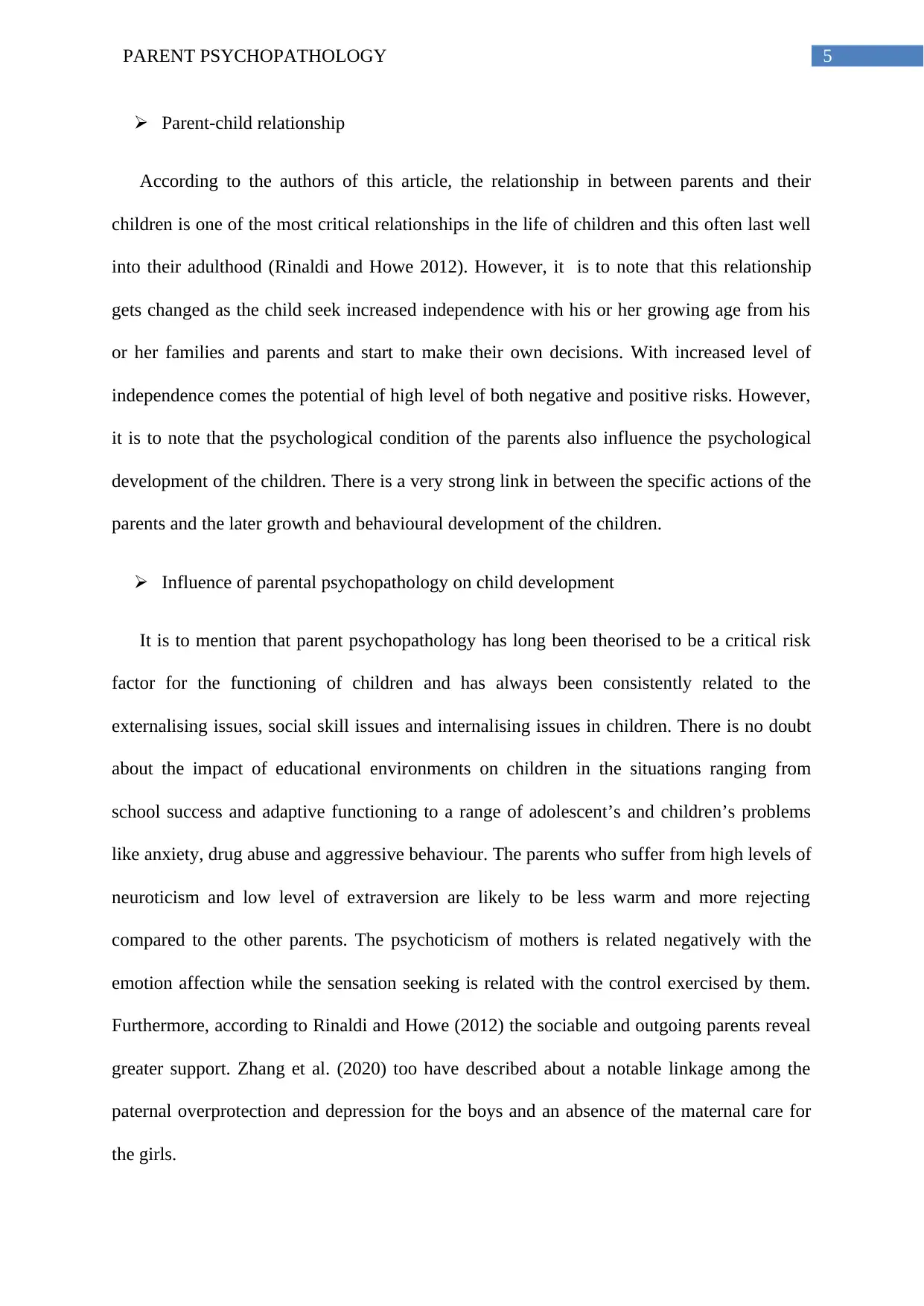
5PARENT PSYCHOPATHOLOGY
Parent-child relationship
According to the authors of this article, the relationship in between parents and their
children is one of the most critical relationships in the life of children and this often last well
into their adulthood (Rinaldi and Howe 2012). However, it is to note that this relationship
gets changed as the child seek increased independence with his or her growing age from his
or her families and parents and start to make their own decisions. With increased level of
independence comes the potential of high level of both negative and positive risks. However,
it is to note that the psychological condition of the parents also influence the psychological
development of the children. There is a very strong link in between the specific actions of the
parents and the later growth and behavioural development of the children.
Influence of parental psychopathology on child development
It is to mention that parent psychopathology has long been theorised to be a critical risk
factor for the functioning of children and has always been consistently related to the
externalising issues, social skill issues and internalising issues in children. There is no doubt
about the impact of educational environments on children in the situations ranging from
school success and adaptive functioning to a range of adolescent’s and children’s problems
like anxiety, drug abuse and aggressive behaviour. The parents who suffer from high levels of
neuroticism and low level of extraversion are likely to be less warm and more rejecting
compared to the other parents. The psychoticism of mothers is related negatively with the
emotion affection while the sensation seeking is related with the control exercised by them.
Furthermore, according to Rinaldi and Howe (2012) the sociable and outgoing parents reveal
greater support. Zhang et al. (2020) too have described about a notable linkage among the
paternal overprotection and depression for the boys and an absence of the maternal care for
the girls.
Parent-child relationship
According to the authors of this article, the relationship in between parents and their
children is one of the most critical relationships in the life of children and this often last well
into their adulthood (Rinaldi and Howe 2012). However, it is to note that this relationship
gets changed as the child seek increased independence with his or her growing age from his
or her families and parents and start to make their own decisions. With increased level of
independence comes the potential of high level of both negative and positive risks. However,
it is to note that the psychological condition of the parents also influence the psychological
development of the children. There is a very strong link in between the specific actions of the
parents and the later growth and behavioural development of the children.
Influence of parental psychopathology on child development
It is to mention that parent psychopathology has long been theorised to be a critical risk
factor for the functioning of children and has always been consistently related to the
externalising issues, social skill issues and internalising issues in children. There is no doubt
about the impact of educational environments on children in the situations ranging from
school success and adaptive functioning to a range of adolescent’s and children’s problems
like anxiety, drug abuse and aggressive behaviour. The parents who suffer from high levels of
neuroticism and low level of extraversion are likely to be less warm and more rejecting
compared to the other parents. The psychoticism of mothers is related negatively with the
emotion affection while the sensation seeking is related with the control exercised by them.
Furthermore, according to Rinaldi and Howe (2012) the sociable and outgoing parents reveal
greater support. Zhang et al. (2020) too have described about a notable linkage among the
paternal overprotection and depression for the boys and an absence of the maternal care for
the girls.
⊘ This is a preview!⊘
Do you want full access?
Subscribe today to unlock all pages.

Trusted by 1+ million students worldwide
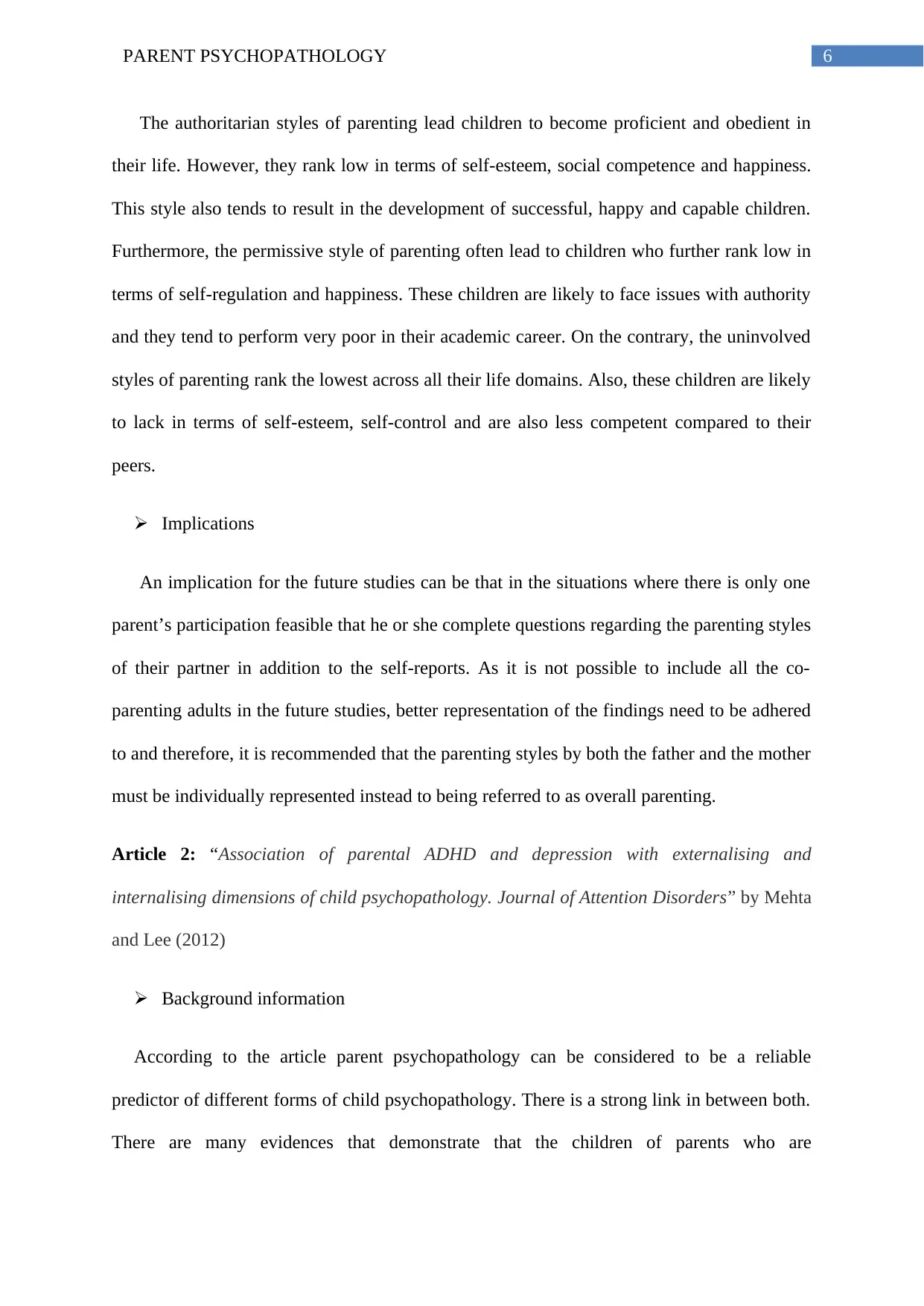
6PARENT PSYCHOPATHOLOGY
The authoritarian styles of parenting lead children to become proficient and obedient in
their life. However, they rank low in terms of self-esteem, social competence and happiness.
This style also tends to result in the development of successful, happy and capable children.
Furthermore, the permissive style of parenting often lead to children who further rank low in
terms of self-regulation and happiness. These children are likely to face issues with authority
and they tend to perform very poor in their academic career. On the contrary, the uninvolved
styles of parenting rank the lowest across all their life domains. Also, these children are likely
to lack in terms of self-esteem, self-control and are also less competent compared to their
peers.
Implications
An implication for the future studies can be that in the situations where there is only one
parent’s participation feasible that he or she complete questions regarding the parenting styles
of their partner in addition to the self-reports. As it is not possible to include all the co-
parenting adults in the future studies, better representation of the findings need to be adhered
to and therefore, it is recommended that the parenting styles by both the father and the mother
must be individually represented instead to being referred to as overall parenting.
Article 2: “Association of parental ADHD and depression with externalising and
internalising dimensions of child psychopathology. Journal of Attention Disorders” by Mehta
and Lee (2012)
Background information
According to the article parent psychopathology can be considered to be a reliable
predictor of different forms of child psychopathology. There is a strong link in between both.
There are many evidences that demonstrate that the children of parents who are
The authoritarian styles of parenting lead children to become proficient and obedient in
their life. However, they rank low in terms of self-esteem, social competence and happiness.
This style also tends to result in the development of successful, happy and capable children.
Furthermore, the permissive style of parenting often lead to children who further rank low in
terms of self-regulation and happiness. These children are likely to face issues with authority
and they tend to perform very poor in their academic career. On the contrary, the uninvolved
styles of parenting rank the lowest across all their life domains. Also, these children are likely
to lack in terms of self-esteem, self-control and are also less competent compared to their
peers.
Implications
An implication for the future studies can be that in the situations where there is only one
parent’s participation feasible that he or she complete questions regarding the parenting styles
of their partner in addition to the self-reports. As it is not possible to include all the co-
parenting adults in the future studies, better representation of the findings need to be adhered
to and therefore, it is recommended that the parenting styles by both the father and the mother
must be individually represented instead to being referred to as overall parenting.
Article 2: “Association of parental ADHD and depression with externalising and
internalising dimensions of child psychopathology. Journal of Attention Disorders” by Mehta
and Lee (2012)
Background information
According to the article parent psychopathology can be considered to be a reliable
predictor of different forms of child psychopathology. There is a strong link in between both.
There are many evidences that demonstrate that the children of parents who are
Paraphrase This Document
Need a fresh take? Get an instant paraphrase of this document with our AI Paraphraser
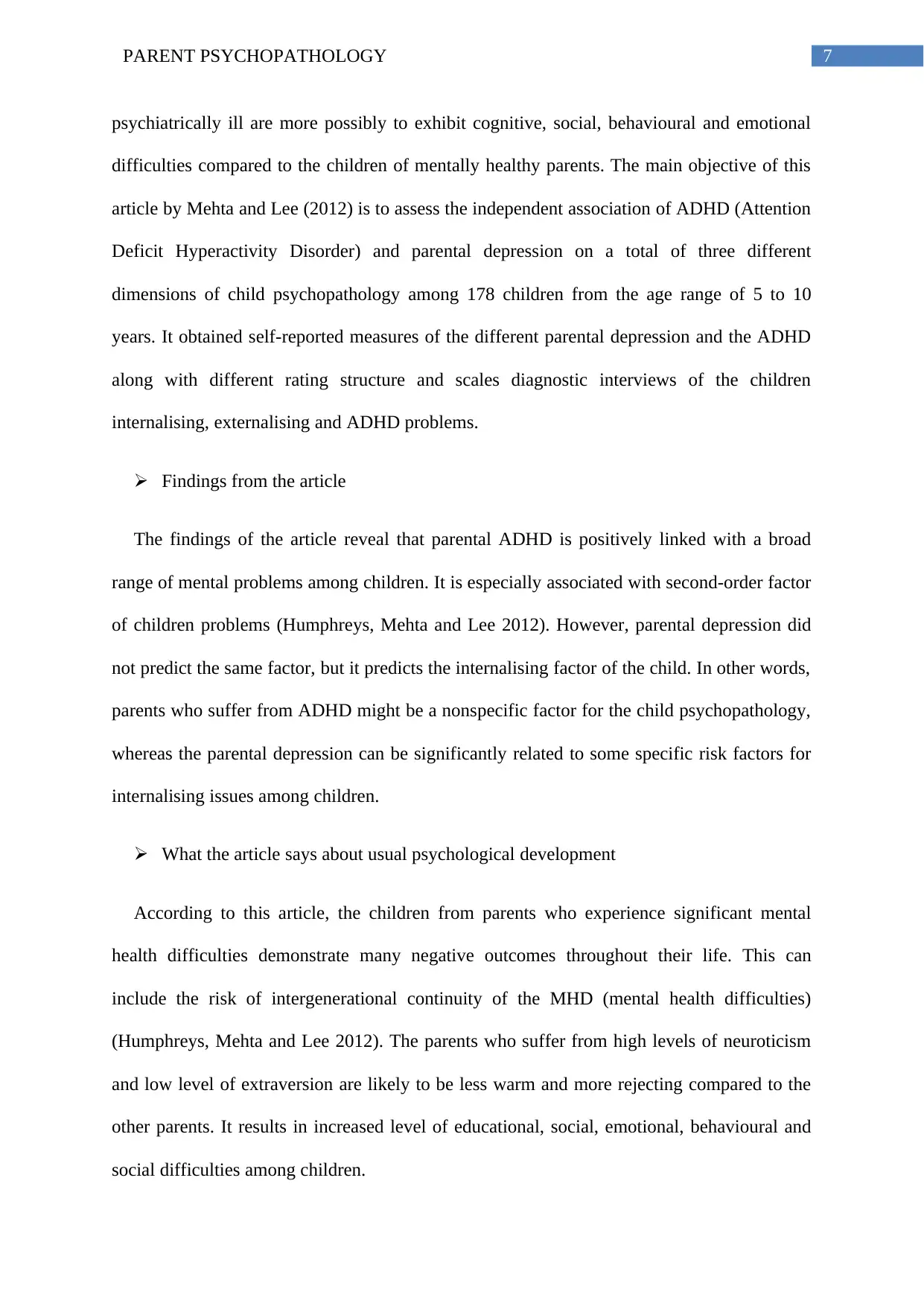
7PARENT PSYCHOPATHOLOGY
psychiatrically ill are more possibly to exhibit cognitive, social, behavioural and emotional
difficulties compared to the children of mentally healthy parents. The main objective of this
article by Mehta and Lee (2012) is to assess the independent association of ADHD (Attention
Deficit Hyperactivity Disorder) and parental depression on a total of three different
dimensions of child psychopathology among 178 children from the age range of 5 to 10
years. It obtained self-reported measures of the different parental depression and the ADHD
along with different rating structure and scales diagnostic interviews of the children
internalising, externalising and ADHD problems.
Findings from the article
The findings of the article reveal that parental ADHD is positively linked with a broad
range of mental problems among children. It is especially associated with second-order factor
of children problems (Humphreys, Mehta and Lee 2012). However, parental depression did
not predict the same factor, but it predicts the internalising factor of the child. In other words,
parents who suffer from ADHD might be a nonspecific factor for the child psychopathology,
whereas the parental depression can be significantly related to some specific risk factors for
internalising issues among children.
What the article says about usual psychological development
According to this article, the children from parents who experience significant mental
health difficulties demonstrate many negative outcomes throughout their life. This can
include the risk of intergenerational continuity of the MHD (mental health difficulties)
(Humphreys, Mehta and Lee 2012). The parents who suffer from high levels of neuroticism
and low level of extraversion are likely to be less warm and more rejecting compared to the
other parents. It results in increased level of educational, social, emotional, behavioural and
social difficulties among children.
psychiatrically ill are more possibly to exhibit cognitive, social, behavioural and emotional
difficulties compared to the children of mentally healthy parents. The main objective of this
article by Mehta and Lee (2012) is to assess the independent association of ADHD (Attention
Deficit Hyperactivity Disorder) and parental depression on a total of three different
dimensions of child psychopathology among 178 children from the age range of 5 to 10
years. It obtained self-reported measures of the different parental depression and the ADHD
along with different rating structure and scales diagnostic interviews of the children
internalising, externalising and ADHD problems.
Findings from the article
The findings of the article reveal that parental ADHD is positively linked with a broad
range of mental problems among children. It is especially associated with second-order factor
of children problems (Humphreys, Mehta and Lee 2012). However, parental depression did
not predict the same factor, but it predicts the internalising factor of the child. In other words,
parents who suffer from ADHD might be a nonspecific factor for the child psychopathology,
whereas the parental depression can be significantly related to some specific risk factors for
internalising issues among children.
What the article says about usual psychological development
According to this article, the children from parents who experience significant mental
health difficulties demonstrate many negative outcomes throughout their life. This can
include the risk of intergenerational continuity of the MHD (mental health difficulties)
(Humphreys, Mehta and Lee 2012). The parents who suffer from high levels of neuroticism
and low level of extraversion are likely to be less warm and more rejecting compared to the
other parents. It results in increased level of educational, social, emotional, behavioural and
social difficulties among children.
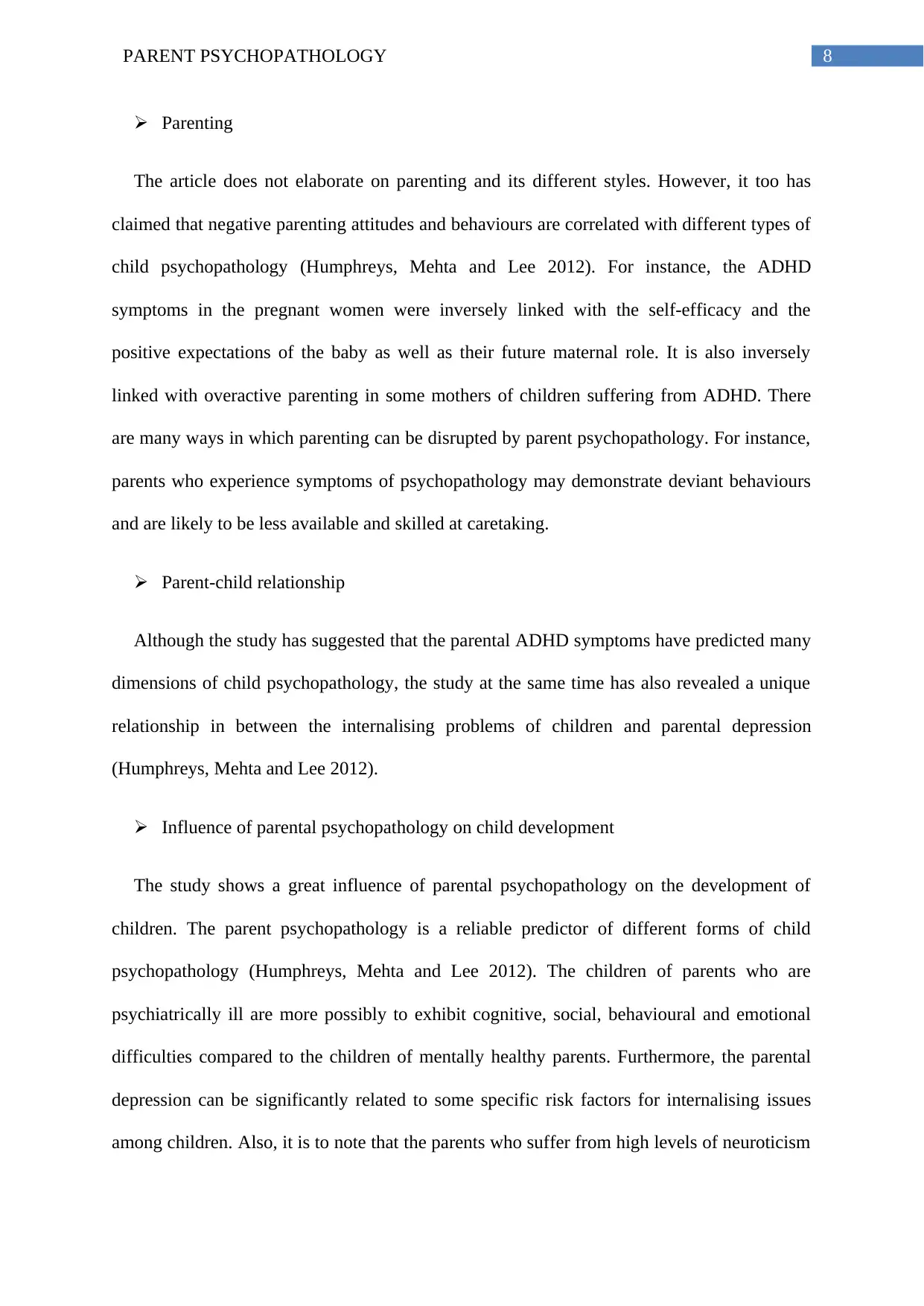
8PARENT PSYCHOPATHOLOGY
Parenting
The article does not elaborate on parenting and its different styles. However, it too has
claimed that negative parenting attitudes and behaviours are correlated with different types of
child psychopathology (Humphreys, Mehta and Lee 2012). For instance, the ADHD
symptoms in the pregnant women were inversely linked with the self-efficacy and the
positive expectations of the baby as well as their future maternal role. It is also inversely
linked with overactive parenting in some mothers of children suffering from ADHD. There
are many ways in which parenting can be disrupted by parent psychopathology. For instance,
parents who experience symptoms of psychopathology may demonstrate deviant behaviours
and are likely to be less available and skilled at caretaking.
Parent-child relationship
Although the study has suggested that the parental ADHD symptoms have predicted many
dimensions of child psychopathology, the study at the same time has also revealed a unique
relationship in between the internalising problems of children and parental depression
(Humphreys, Mehta and Lee 2012).
Influence of parental psychopathology on child development
The study shows a great influence of parental psychopathology on the development of
children. The parent psychopathology is a reliable predictor of different forms of child
psychopathology (Humphreys, Mehta and Lee 2012). The children of parents who are
psychiatrically ill are more possibly to exhibit cognitive, social, behavioural and emotional
difficulties compared to the children of mentally healthy parents. Furthermore, the parental
depression can be significantly related to some specific risk factors for internalising issues
among children. Also, it is to note that the parents who suffer from high levels of neuroticism
Parenting
The article does not elaborate on parenting and its different styles. However, it too has
claimed that negative parenting attitudes and behaviours are correlated with different types of
child psychopathology (Humphreys, Mehta and Lee 2012). For instance, the ADHD
symptoms in the pregnant women were inversely linked with the self-efficacy and the
positive expectations of the baby as well as their future maternal role. It is also inversely
linked with overactive parenting in some mothers of children suffering from ADHD. There
are many ways in which parenting can be disrupted by parent psychopathology. For instance,
parents who experience symptoms of psychopathology may demonstrate deviant behaviours
and are likely to be less available and skilled at caretaking.
Parent-child relationship
Although the study has suggested that the parental ADHD symptoms have predicted many
dimensions of child psychopathology, the study at the same time has also revealed a unique
relationship in between the internalising problems of children and parental depression
(Humphreys, Mehta and Lee 2012).
Influence of parental psychopathology on child development
The study shows a great influence of parental psychopathology on the development of
children. The parent psychopathology is a reliable predictor of different forms of child
psychopathology (Humphreys, Mehta and Lee 2012). The children of parents who are
psychiatrically ill are more possibly to exhibit cognitive, social, behavioural and emotional
difficulties compared to the children of mentally healthy parents. Furthermore, the parental
depression can be significantly related to some specific risk factors for internalising issues
among children. Also, it is to note that the parents who suffer from high levels of neuroticism
⊘ This is a preview!⊘
Do you want full access?
Subscribe today to unlock all pages.

Trusted by 1+ million students worldwide
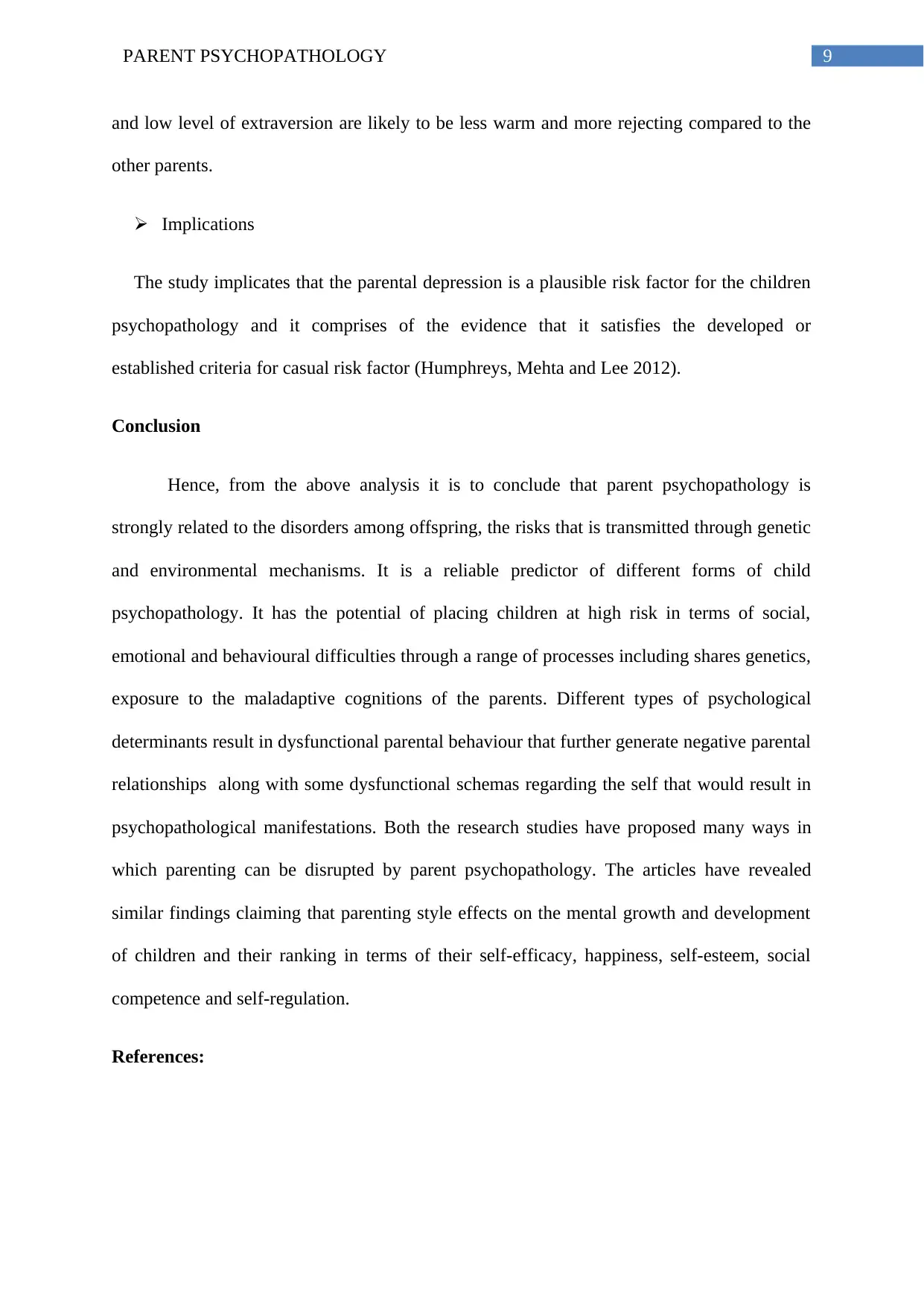
9PARENT PSYCHOPATHOLOGY
and low level of extraversion are likely to be less warm and more rejecting compared to the
other parents.
Implications
The study implicates that the parental depression is a plausible risk factor for the children
psychopathology and it comprises of the evidence that it satisfies the developed or
established criteria for casual risk factor (Humphreys, Mehta and Lee 2012).
Conclusion
Hence, from the above analysis it is to conclude that parent psychopathology is
strongly related to the disorders among offspring, the risks that is transmitted through genetic
and environmental mechanisms. It is a reliable predictor of different forms of child
psychopathology. It has the potential of placing children at high risk in terms of social,
emotional and behavioural difficulties through a range of processes including shares genetics,
exposure to the maladaptive cognitions of the parents. Different types of psychological
determinants result in dysfunctional parental behaviour that further generate negative parental
relationships along with some dysfunctional schemas regarding the self that would result in
psychopathological manifestations. Both the research studies have proposed many ways in
which parenting can be disrupted by parent psychopathology. The articles have revealed
similar findings claiming that parenting style effects on the mental growth and development
of children and their ranking in terms of their self-efficacy, happiness, self-esteem, social
competence and self-regulation.
References:
and low level of extraversion are likely to be less warm and more rejecting compared to the
other parents.
Implications
The study implicates that the parental depression is a plausible risk factor for the children
psychopathology and it comprises of the evidence that it satisfies the developed or
established criteria for casual risk factor (Humphreys, Mehta and Lee 2012).
Conclusion
Hence, from the above analysis it is to conclude that parent psychopathology is
strongly related to the disorders among offspring, the risks that is transmitted through genetic
and environmental mechanisms. It is a reliable predictor of different forms of child
psychopathology. It has the potential of placing children at high risk in terms of social,
emotional and behavioural difficulties through a range of processes including shares genetics,
exposure to the maladaptive cognitions of the parents. Different types of psychological
determinants result in dysfunctional parental behaviour that further generate negative parental
relationships along with some dysfunctional schemas regarding the self that would result in
psychopathological manifestations. Both the research studies have proposed many ways in
which parenting can be disrupted by parent psychopathology. The articles have revealed
similar findings claiming that parenting style effects on the mental growth and development
of children and their ranking in terms of their self-efficacy, happiness, self-esteem, social
competence and self-regulation.
References:
Paraphrase This Document
Need a fresh take? Get an instant paraphrase of this document with our AI Paraphraser
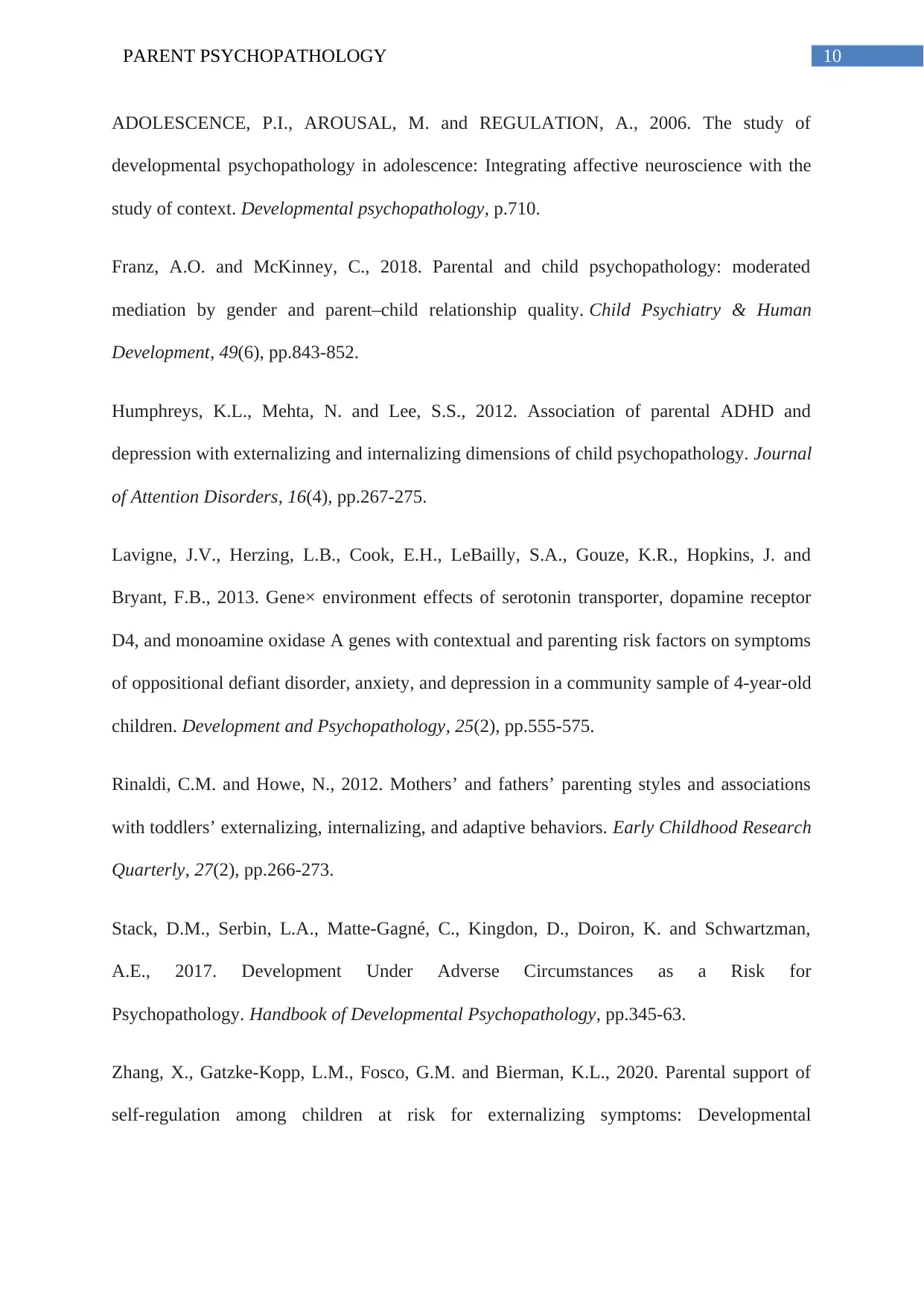
10PARENT PSYCHOPATHOLOGY
ADOLESCENCE, P.I., AROUSAL, M. and REGULATION, A., 2006. The study of
developmental psychopathology in adolescence: Integrating affective neuroscience with the
study of context. Developmental psychopathology, p.710.
Franz, A.O. and McKinney, C., 2018. Parental and child psychopathology: moderated
mediation by gender and parent–child relationship quality. Child Psychiatry & Human
Development, 49(6), pp.843-852.
Humphreys, K.L., Mehta, N. and Lee, S.S., 2012. Association of parental ADHD and
depression with externalizing and internalizing dimensions of child psychopathology. Journal
of Attention Disorders, 16(4), pp.267-275.
Lavigne, J.V., Herzing, L.B., Cook, E.H., LeBailly, S.A., Gouze, K.R., Hopkins, J. and
Bryant, F.B., 2013. Gene× environment effects of serotonin transporter, dopamine receptor
D4, and monoamine oxidase A genes with contextual and parenting risk factors on symptoms
of oppositional defiant disorder, anxiety, and depression in a community sample of 4-year-old
children. Development and Psychopathology, 25(2), pp.555-575.
Rinaldi, C.M. and Howe, N., 2012. Mothers’ and fathers’ parenting styles and associations
with toddlers’ externalizing, internalizing, and adaptive behaviors. Early Childhood Research
Quarterly, 27(2), pp.266-273.
Stack, D.M., Serbin, L.A., Matte-Gagné, C., Kingdon, D., Doiron, K. and Schwartzman,
A.E., 2017. Development Under Adverse Circumstances as a Risk for
Psychopathology. Handbook of Developmental Psychopathology, pp.345-63.
Zhang, X., Gatzke-Kopp, L.M., Fosco, G.M. and Bierman, K.L., 2020. Parental support of
self-regulation among children at risk for externalizing symptoms: Developmental
ADOLESCENCE, P.I., AROUSAL, M. and REGULATION, A., 2006. The study of
developmental psychopathology in adolescence: Integrating affective neuroscience with the
study of context. Developmental psychopathology, p.710.
Franz, A.O. and McKinney, C., 2018. Parental and child psychopathology: moderated
mediation by gender and parent–child relationship quality. Child Psychiatry & Human
Development, 49(6), pp.843-852.
Humphreys, K.L., Mehta, N. and Lee, S.S., 2012. Association of parental ADHD and
depression with externalizing and internalizing dimensions of child psychopathology. Journal
of Attention Disorders, 16(4), pp.267-275.
Lavigne, J.V., Herzing, L.B., Cook, E.H., LeBailly, S.A., Gouze, K.R., Hopkins, J. and
Bryant, F.B., 2013. Gene× environment effects of serotonin transporter, dopamine receptor
D4, and monoamine oxidase A genes with contextual and parenting risk factors on symptoms
of oppositional defiant disorder, anxiety, and depression in a community sample of 4-year-old
children. Development and Psychopathology, 25(2), pp.555-575.
Rinaldi, C.M. and Howe, N., 2012. Mothers’ and fathers’ parenting styles and associations
with toddlers’ externalizing, internalizing, and adaptive behaviors. Early Childhood Research
Quarterly, 27(2), pp.266-273.
Stack, D.M., Serbin, L.A., Matte-Gagné, C., Kingdon, D., Doiron, K. and Schwartzman,
A.E., 2017. Development Under Adverse Circumstances as a Risk for
Psychopathology. Handbook of Developmental Psychopathology, pp.345-63.
Zhang, X., Gatzke-Kopp, L.M., Fosco, G.M. and Bierman, K.L., 2020. Parental support of
self-regulation among children at risk for externalizing symptoms: Developmental
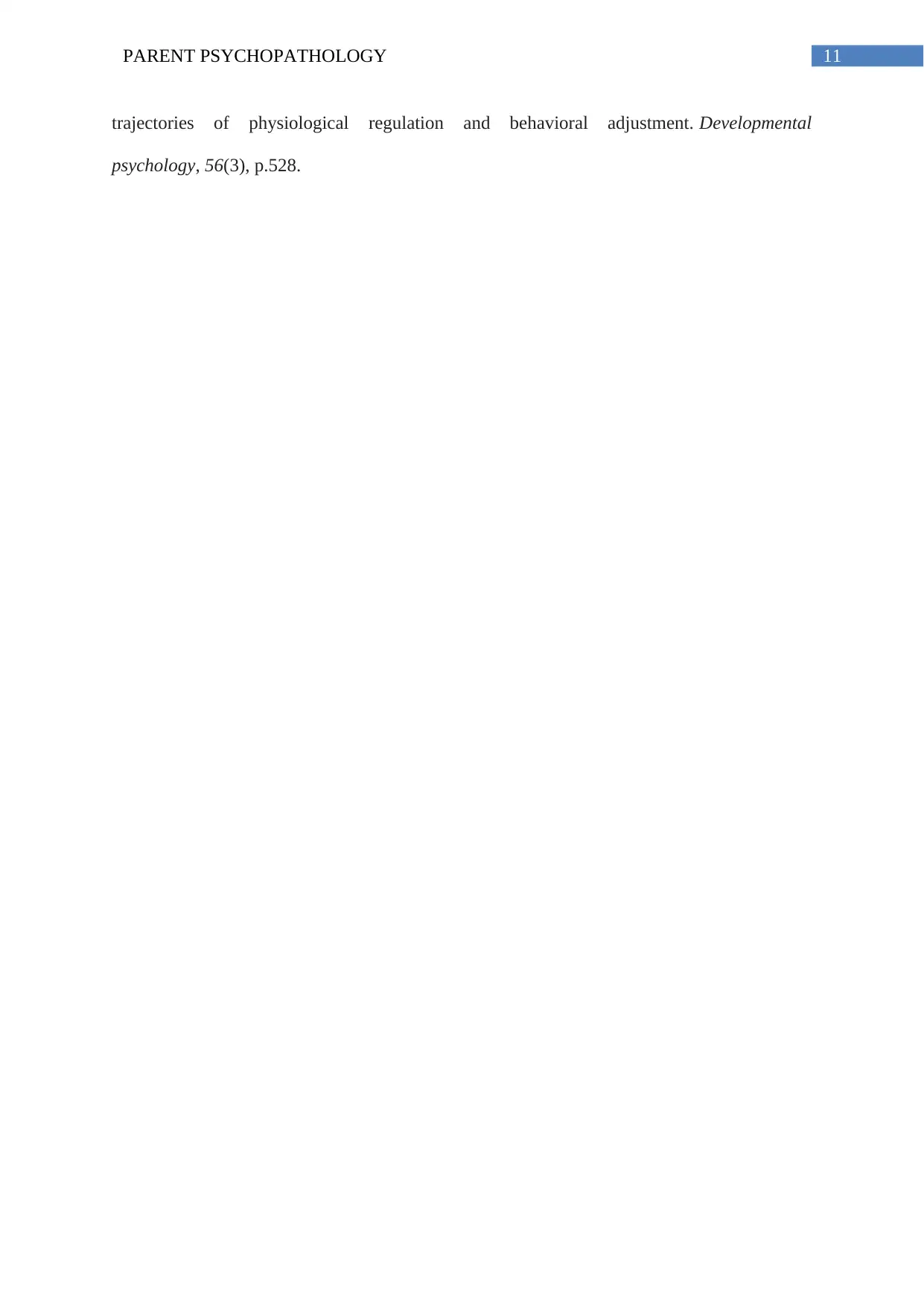
11PARENT PSYCHOPATHOLOGY
trajectories of physiological regulation and behavioral adjustment. Developmental
psychology, 56(3), p.528.
trajectories of physiological regulation and behavioral adjustment. Developmental
psychology, 56(3), p.528.
⊘ This is a preview!⊘
Do you want full access?
Subscribe today to unlock all pages.

Trusted by 1+ million students worldwide
1 out of 12
Related Documents
Your All-in-One AI-Powered Toolkit for Academic Success.
+13062052269
info@desklib.com
Available 24*7 on WhatsApp / Email
![[object Object]](/_next/static/media/star-bottom.7253800d.svg)
Unlock your academic potential
Copyright © 2020–2025 A2Z Services. All Rights Reserved. Developed and managed by ZUCOL.




